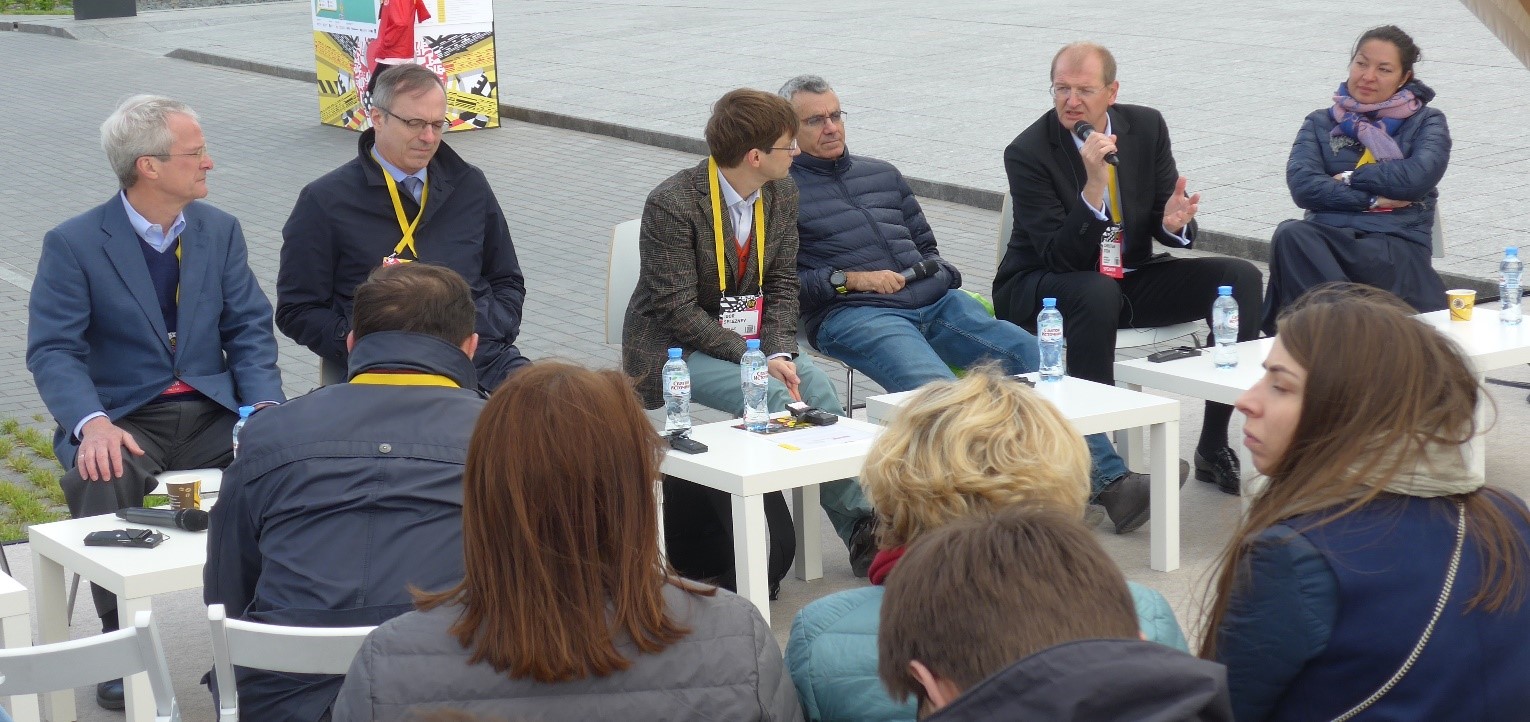
Participating in the Skoltech-organized panel session at Startup Village, were (from left to right) Christopher Noble, Technology Licensing Officer and Director of Corporate Engagement at MIT; Patrick Ferran, Vice President of NineSigma; Igor Seleznev, panel moderator; Shlomo Nimrodi, CEO of Ramot – the Business Engagement Center at Tel Aviv University; Christian Stein, the CEO of Ascenion GmbH; and Vera Rybko, Industry Project Manager at Skoltech’s Center of Life Sciences. Photo: Skoltech.
While the recent Skolkovo Startup Village placed the spotlight on inventions and innovations at their early phases of monetization, a Skoltech-organized panel session examined another key aspect of startup business development: relationships between academia and corporations, and the importance of linking them through technology transfer.
The Startup Village’s six-member panel, titled: “From Science to Market: Bridging the Gap,” underscored the importance of applying technology transfer in linking innovation at institutes such as Skoltech to industry.
As panel member Patrick Ferran succinctly put it: “The role of tech transfer is to expose industry to the academic sector, and academics to industry”. Ferran is Vice President of NineSigma, a global company that facilitates open innovation, and he cited Skoltech as a role model in combining both innovation and entrepreneurship in one institution.
“If we don’t have fundamental science, innovation would never happen,” he said, “but corporations aren’t made for basic science. They don’t do it, and they aren’t interested in doing it.” What corporations are interested in, he explained, is seeing the potential for basic science to positively impact their business. “They want to see a prototype or proof of concept – something beyond just a scientific paper.”
Basic science and marketable solutions are indeed often intertwined, agreed Shlomo Nimrodi. He is the CEO of Ramot – the Business Engagement Center at Tel Aviv University – and observed: “Of corporations, venture capitalists and universities, the only one that invests deeply in basic science are academic institutions. Many of the challenges society faces are multidisciplinary in nature, and many solutions require deep science behind them.”
The attraction of institutes such as Skoltech for entrepreneurs
It is for this reason, Nimrodi explained, that a research institute such as Skoltech and his own Tel Aviv University are alluring to entrepreneurs. “They are where a lot of money is being spent; it’s a good reason to seek innovation inside academic institutions.”
Christian Stein, the CEO of Ascenion GmbH – a German-based partner for technology transfer – counseled the advantages of patience and a long view of an invention’s possible market applications. He cited the MP3 file format, which, “everybody uses now, but in the beginning, nobody knew what it would be good for when the patents were filed in the 1980s.”
Stein noted that a current trend among universities is to abandon patents and ideas after approximately four years if no industry partner is found. “But the process might take eight or 12 years. A long-term plan and strategy is essential for success.”
Christopher Noble, Technology Licensing Officer and the Director of Corporate Engagement at the Massachusetts Institute of Technology (MIT) noted another key ingredient to success: “If you want to be an entrepreneur, you have to have a passion,” he said. “Funding isn’t enough.”
A similarity that links entrepreneurs and academics: passion
Noble added that entrepreneurs and academics are sometimes seen as polar opposites, but said he perceives quite a bit of similarity between the two. “Both academics and entrepreneurs want to come up with new ideas. They’re often very different, yes, but I’ve seen so many times an amazing alignment because they both have that passion. There’s a natural connection.”
Offering his assessment of Skoltech’s future, Noble suggested that the institute’s success will depend upon its continuing ability to attract talent. “Skoltech is competing with other universities for the best faculty and students,” he said, “and talented faculty and students will go to universities that have the resources that allow them to express their passions.”
Noble has a first-hand understanding of Skoltech, having seen its development since the institute’s 2011 creation in collaboration with MIT, and is now looking forward Skoltech’s transfer to a large, purpose-built campus on the Skokovo grounds. “When I first started attending events here, this site was little more than a grassy field. What I see today a testament to what can be accomplished with a vision and resources,” he said.
Vera Rybko, the Industry Project Manager at Skoltech’s Center of Life Sciences, wholeheartedly agreed with Noble, noting the institute’s success in the establishment of clear rules and a systemic support for technology transfers. “Skoltech will continue to be successful. Absolutely.”
